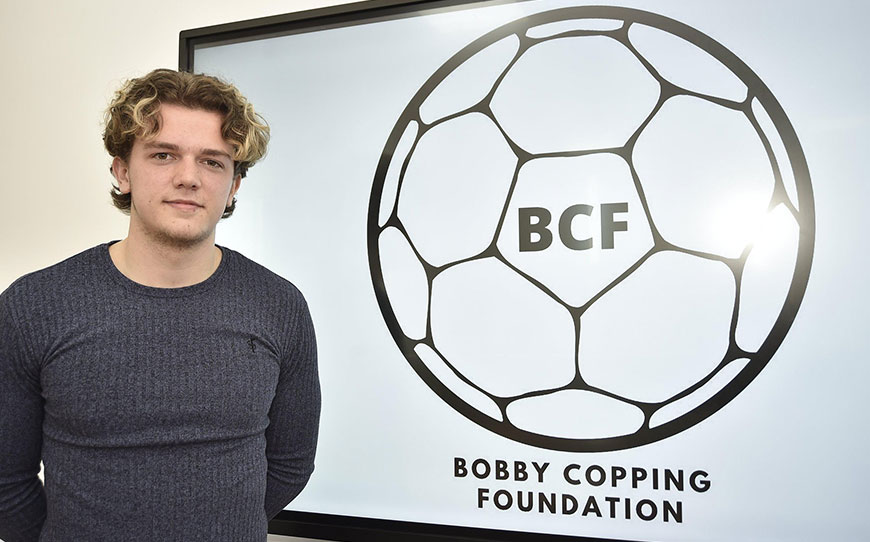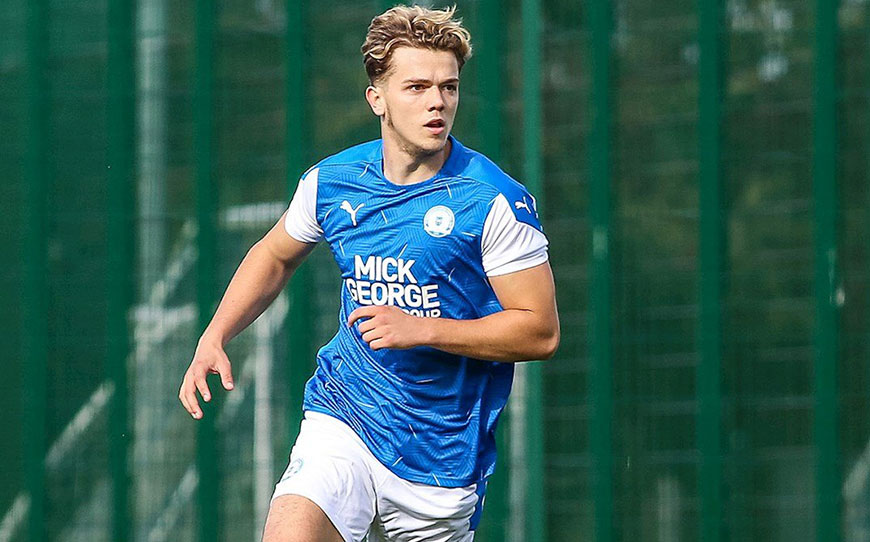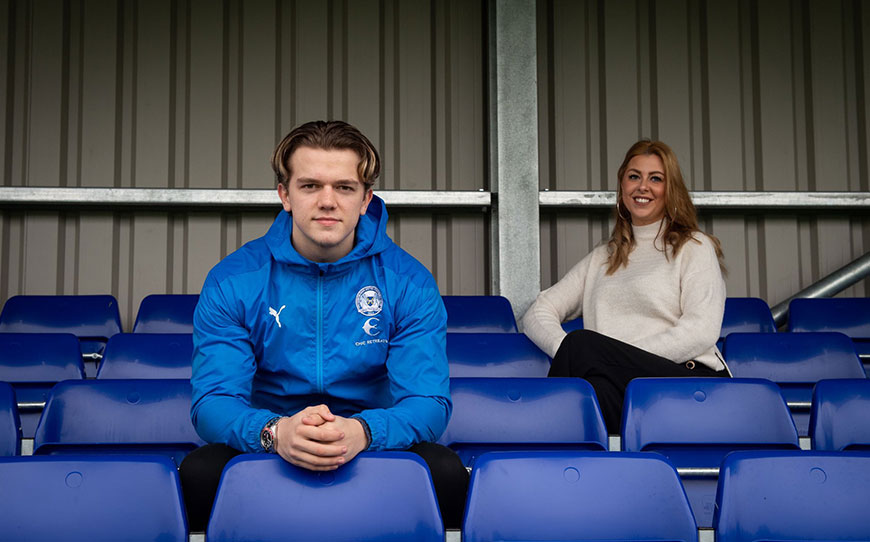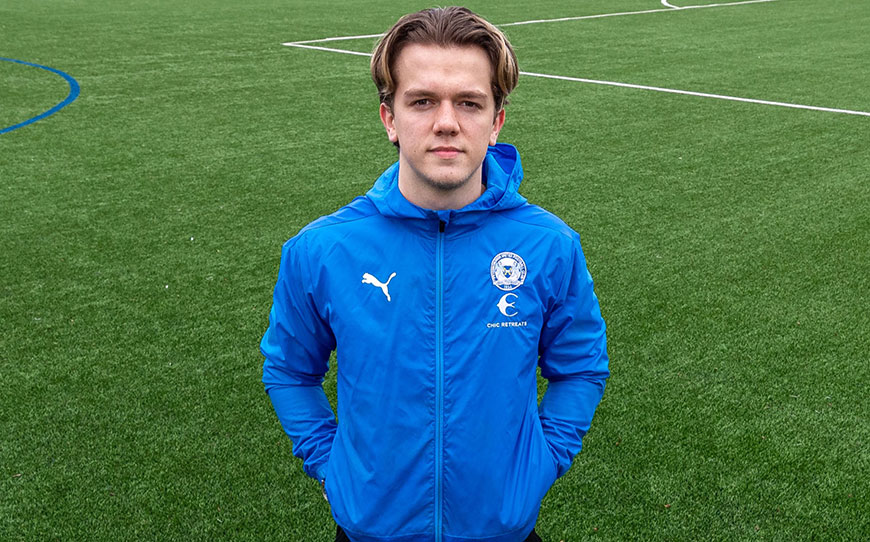If football has taught Bobby Copping anything, it is resilience.
As a 16-year-old, he was released by his boyhood club, Norwich City, and moved over 200 miles up north to sign as an apprentice at Bury.
Following a promising first season, his time at Gigg Lane was brought to an abrupt end when the club’s financial difficulties led to expulsion from the EFL.
And the cruellest test of all came in February, when Copping made the heartbreaking decision to retire from playing after suffering a recurring head injury that left him with impaired vision and numbness on the left side of his body.
“I’ve had to deal with quite a lot of hardship over the past few years and I could’ve gone down a really dark path,” he told LFE. “You hear stories of people that drift towards drugs, alcohol, crime and that could’ve been me.
“Having to retire from something I love and something I’ve worked for my whole life has been incredibly tough. After I’d made the decision, I sat in my room with the curtains closed, I turned my phone off and didn’t message anyone for about two weeks.
“I was ordering takeaway after takeaway. Anyone that knows me is aware that I love going to the gym, but I lost all motivation, even though I had equipment in my living room. I look back now and feel grateful that I had a lot of support and was able to find a way out of the darkness.”
Six months on from his premature retirement, the 19-year-old is using his experience to help others via the Bobby Copping Foundation, which aims to provide emotional support and guidance to players, their families and staff involved in elite sport.

“One thing I’ve learned is that you’re going to encounter adversity at various points in time, whether it’s in football or everyday life, and you’ve got to maintain a positive outlook to overcome it,” said Copping.
“Having struggled mentally, I wanted to share my story to people who might be in a similar position to where I’ve been, so over the past few months, I’ve been up and down the country delivering talks to clubs and schools. I talk about the highs and lows of my career and the strategies I used to overcome the obstacles.
“I received one message from a kid who said that he had been suicidal, but after listening to how I’d dealt with my situation, it gave him a different perspective and basically saved his life. To read that and know I’ve already been able to make an impact on someone is absolutely brilliant.
All I want to do is help people and show that it’s possible to use a negative situation to gain a positive outcome.”
Copping had spent nine years in Norwich’s academy before being released, but brushed off the rejection quickly, turning down interest from Luton Town in favour of a move to Bury.
“It was a great club; Bury was like a family,” he said. “The Under-18s were doing so well, reaching the quarter finals of the Youth Cup and only losing to Liverpool. To go from that to not getting paid and not knowing if we’d still have a job was extremely tough.
“I remember on the last day, we were sitting in the canteen waiting for news of a new chairman. It got to the evening and there were still no developments. For the first-team players that had families and mortgages to pay, it must’ve been even worse, but for us younger lads, we’d lost our club and there was a chance we’d lost our careers.”
As a Category Three academy, the Shakers were punching above their weight. Aaron Skinner moved on to Tottenham Hotspur, Callum Hulme signed for Leicester City, Saul Shotton found a home at West Bromwich Albion, Joe Adams departed for Brentford and Femi Seriki earned a deal at Sheffield United, to name just a few.
Defender Copping was also handed a lifeline at a higher level, bouncing back from his second significant setback in 18 months.
He said: “I had offers from Sunderland and Peterborough United, and then I’d also been on trial for a week at Brighton, although unfortunately I didn’t get offered anything from them.
“I did consider Sunderland as a good option, but Peterborough just made me feel wanted. The gaffer, Darren Ferguson, pulled me in for a chat and went through clips of me, saying what I do well and what he wanted me to improve on. As a 17-year-old kid at the time, for the first-team manager to be explaining exactly why he wanted to sign me, I couldn’t go anywhere else.”

The young centre-back wasted no time in making an impression at his new club, earning a senior debut in the EFL Trophy just a month after penning his professional contract, while he was an unused substitute in Sky Bet League One before the 2019/20 campaign was brought to a halt due to the Covid-19 outbreak.
“Just before the pandemic hit, I was playing really well and knocking on the door of the first team,” Copping continued. “I was probably talking to the manager a couple of times a week, asking him how I could make that next step.
“During lockdown, I made a commitment to take my fitness to the next level. I gained 14kg of muscle and I returned to training in the best shape of my life.”
However, Copping’s career took an unexpected turn when a routine header caused a loss of sight, which proved to be the start of a torrid journey.
“It was a hot day and I thought I might be dehydrated, so I just said to the coach that I needed a drink and then I’d be alright,” he said. “I completed the session with probably 10% of my vision.
“Afterwards, I walked into the physio room and that’s when the left side of my body started to go numb. I went to hospital and they thought it was a concussion. It took me five months to gradually build back up to a point where I was ready to play my first 90 minutes against Luton Under-23s.
“But in the warm-up before that game, the exact same thing happened, where I went up for a header, landed and couldn’t see. This time was much worse, and I had to be carried off the pitch.
“I was in hospital having all sorts of different procedures and they thought I might’ve had a mini stroke. It was a scary time and I remember being stood outside the hospital crying my eyes out, because I’d been told I couldn’t play football again.”

Copping was sent to see a specialist, but after failed attempts to find a suitable medication, the decision was made to protect his long-term health and avoid any more trauma triggering episodes.
The youngster credits Peterborough for supporting him throughout the tough times, allowing an extended leave before designing a plan for him to remain at the club in various different capacities.
“The club have been amazing to me,” he added. “The gaffer let me go home for as long as I needed and then I messaged the Academy Manager, Kieran Scarff, asking what they could offer me. He came back with multiple suggestions, so they’d taken the time to think about where I could fit in.
“I spoke about what direction I felt I wanted to go and they actually created a new Business Operations position for me to take on. I’m now doing four roles, with the club giving me all these different responsibilities to gain experience.
“The plan is that in a year or two, I can make an informed decision on what route I want to pursue full-time. They’ve given me the platform to learn exactly what I want to do with my future career.”
Having identified business and coaching as his two preferred pathways, Copping juggles his time as Head of Schools Initiatives, Operations Manager of the women’s team, Under14s Assistant Manager and Head of Affiliations.
Additionally, he is using his spare time to achieve several qualifications, completing scouting courses with S4 Scouting, becoming a fully qualified Personal Trainer via The Fitness Circle and being accepted onto the UEFA B Coaching course, while he is also starting a Masters in Sports Business Management with the Sports Institute of Barcelona in the autumn.
“I’m really busy, but it’s exciting,” the Essex-born teenager said. “I’ve got two main goals at the moment, which are to either become a first-team manager or a sporting director, so to have the chance to gain experience and qualifications in both areas is amazing.
“It’s been five or six months since I retired, so to be in the position I’m in already in such a short space of time is fantastic and I couldn’t have done any of it without all the help I’ve had.”

He also received an outpouring of support from the general public after his injury woes were revealed, with people’s kindness encouraging Copping to create his own charity, alongside Peterborough’s Player Care Manager Kayleigh Stent.
Generous contributions have allowed the initiative to grow, including donations from Chelsea and England legend John Terry, who auctioned a range of souvenirs and items which raised over £7,000.
“I received messages from all over the world,” he said. “I had hundreds of requests on Instagram, I was getting loads of emails and I had letters being sent to Peterborough’s training ground.
“That response gave me the motivation to give something back, so I decided to run 18km every day in April in support of Mind, after seeing a statistic that on average there are 18 deaths due to suicide per day. I raised over £1,000.
“After that, Kayleigh and I discussed the idea of the foundation. She recently became a fully qualified counsellor and one of our ambitions is to offer a free of charge counselling service for people in need.
“There are some really nice people in the world and every donation we’ve received has helped us to progress, whether it’s been used to buy equipment for talks, organising the counselling service or put towards the setting up costs that are involved with trying to register a charity.”
Copping’s determined mindset has enabled him to quickly establish a new route to success off the pitch, while he is also self-aware of his emotional well-being.
“It’s been a crazy few months, dealing with being in the public eye and handling all the attention,” the Mintridge Foundation ambassador said. “I’m making great strides in my career, but I’ve also made sure that I’ve given myself time to look after my mental health.
“It’s common for people to go through something traumatic and do so much stuff to keep it off their mind, then later down the line it suddenly hits them. I’ve tried to be open and honest about my feelings and doing my talks has helped me to do that.
Sometimes you might feel down, you might have a cry, but that’s part of the process of dealing with it. I’m effectively grieving for the loss of my career.
“Some people are quite scared to talk to me about it, but I try to make it a normal topic of conversation. Everything happens for a reason and I’m moving forward on the path that I’m meant to be on.”
Bobby Copping features in Issue 42 of LFE’s Touchline magazine.





